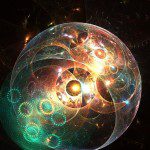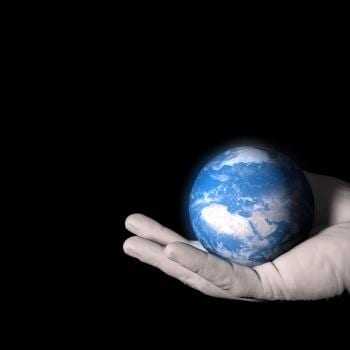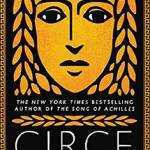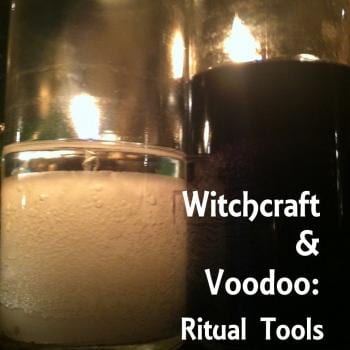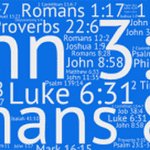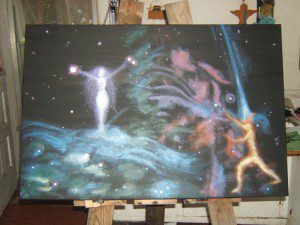
Now that Paganism has, in general, a certain amount of popular acceptance; and now that we’ve been around for a while, we are in the process of trying to define where we all stand in the Big Tent of Paganism; or if we even stand there at all. Our attempts to claim our individual identities are causing a lot of argument and strife. On the fringes of one level of debate are the Humanistic Pagans, the most extreme of which are the Atheist Pagans, who lean towards scientific rationalism, for whom Deities are metaphors, archetypes and symbols, and may not even be necessary to their spiritual practice; and on the other are the Polytheists, the most extreme of which are the Hard Polytheists, who are more mystically inclined and who believe that the Deities are physical, real, tangible beings with individual agency. Many of us are on the fence and these tensions are pulling Paganism in very different directions, to the point that there may be a schism. Since both sides clearly feel marginalized by the Pagan community as a whole, it’s already starting I think, and that makes me sad. I don’t think we’re strong enough to stand in our own little corners on this issue yet, and I don’t think we’re as different as we think we are.
So, where do I stand in all of this? Well, it’s going to sound like a cop-out, but I am both. I am not on the fence about it; I am firmly both. I am a polytheist: I keep altars in my home to individual deities; I have literal in-person encounters with them; I have had some powerful mystical experiences related to those connections. I am also a humanist: I have written about the humanistic roots of the modern Pagan movement; I have addressed the concept of archetypes and Jungian psychology in our worship; I believe that science is the method by which the universe is made. In the full spirit of Wicca’s ability to embrace contradictory truths at once, I genuinely believe that both of these things are true.
This is part of what I mean about being a “liminal witch.” As people line up to take sides on this issue and much of the Pagan community is divided; I say, “Yes, and.”
How can you possibly believe that? you might ask me. How can you believe that the gods are literal beings with individual agency, and that they are archetypes of the human psyche?
That’s a fair question. The answer is in the special nature of humanity.
We are mortal creatures. We are physical beings with bodies. It limits us to the rules of three dimensions. We must exist in time and space and deal with those restrictions. Furthermore, these mortal bodies have expiry dates. Also, they can be damaged to a point that we no longer care to inhabit them.
But what’s beyond that? Is there something else that we are? Are we creatures of spirit as well as matter?
Many of us would say yes. To you I nod and say, “Yes, I agree.” As Yoda put it, “Luminous beings are we, not this crude matter.” Or rather, “luminous beings are we, and this crude matter.” And let’s not emulate Christians or Buddhists by denigrating that matter. Without it, we would not be able to taste chocolate, or feel the touch of a lover on our skin, or smell the fresh scent of oncoming rain, or even to watch a sunrise in the same way. Bodies are pretty cool things. The price is pain, but I like being physical and I think that up to a point, it’s worth that price to have this body.
To those of you who say no, I say, “Explain thought.” You might tell me it’s the workings of our neurons and neurotransmitters. And yes, it is that. But how, exactly, does it work? We have no idea. I believe in science, and I believe that science represents the mechanics by which the universe is created, and I also believe that eventually science could give us that answer, but right now we don’t know. Work in quantum computing is promising; but matter becomes . . . fuzzy . . . at that level. When we are discussing quantum particles, they are probabilities, not certainties. Each quantum particle may or may not exist in a particular spot at a particular moment, just like the binary language of computing. Matter at that level is numinous.
Let’s consider now the nature of the gods. Let’s run with the theory that they are entirely creations of the human mind. (Bear with me here.) Let’s say that they are exactly what sociologists say they are: they are archetypes, egregors, created from the subconscious soup of the human psyche, understood by us because of the universality of the human experience and personified by us so that we can relate to Them on some level.
In high magick, there is a custom by which one creates an elemental. Yes, one creates a spiritual being as an egregor – a thought-form – and charges it to particular purpose. That entity then goes out and does things that have real effects in our world. If one is responsible, one also mandates its dissolution once that purpose has been fulfilled. I have done it and it works, so I know that it is possible to create an entity out of a thought-form on whatever the astral plane might be through the power of my own will. Now, you may not believe in my experience, and that’s okay. For me, I have seen the evidence of this and I am convinced. Call it the placebo effect, if you will.
If that is possible, shouldn’t it be even more possible when speaking of greater spirit-beings? Individuals can create elementals; can cultures create gods?
Why not? For the humanist/atheist, the fact that gods seem not to spring fully-formed from the ether, but have significant elements that are similar to deities in other cultures that have contacted each other, requires no explanation; but for those who believe in the literal existence of the gods, and that They are individual beings with agency, this is a challenge to belief that requires either selective blindness, or an intelligent answer. This, I think, is a reasonable answer. The gods literally exist, but They share certain similarities because we created Them.
Before you go storming off, consider this. Really think about it. I am saying, “Yes, and” here. They’re real; I’m not denying that. They have individual agency; I’m not denying that either. But I’m saying that They are complex thought-forms; and so yes, They are also archetypes and ideas. They very well might be the placebo effect in action on a massive scale! In our heads, yes; but not “just” in our heads.
Those who have done spirit-work know that if you want to talk to the gods, you’ve got to get into the right-brain. The left-brain world of logic is not how you open up the godphone. You need expansive awareness; interconnectedness; and also, imagination and creativity. I’ve written in my book extensively about how the same part of your mind that writes music, makes art and imagines stories is the same part that opens up psychic awareness. That’s why the Druids believed that the powers of a bard and the powers of a seer were one and the same, and they called it Awen. If you want to see a good video that illustrates the differences, and how it is necessary to have both left and right-brain awareness to be a fully functioning human being, watch this (this video makes me cry every time I see it):
The atheists among you are now saying, “See? It’s imagination; it’s all in your head!” You’re saying that it’s subconscious messages that are being given some pattern by your left brain. You might even be right. But remember what I said about matter being numinous? And keep in mind that matter at that level is easily influenced by expectation. The very act of observing it changes the results you get. We know all about the placebo effect. So we know that our mind can, and does, create reality.
Is it all in our heads? Sure it is. But if that’s “all it is,” why is one entire half of our brain dedicated to just this sort of awareness? Surely half of our brain matter isn’t a redundant system.
Now, let’s leave that for a moment and consider the nature of the universe.
We all know the Big Bang happened. We all know that the Universe is expanding from the explosion. What boggles scientists currently is that this rate of expansion defies the laws of physics as we understand them. The rate of expansion continues to increase, when it should be decreasing. Why? One current theory of the hows and whys of the creation of the universe is that we borrow energy from the future to create the present.
So then, what’s causing that?
We are physical beings. We are limited by the nature of physical reality. But our gods are not. By design, They are beyond all space and all time. If the gods actually exist, is it possible that They, who are beyond all space and all time, enacted the energetic exchange that built atoms, then protein polymers, and ultimately, us?
So the gods created the universe . . . and we created the gods.
I think this explains much about the human/divine experience. Many critics of the polytheists have asked, “If the gods actually exist, why would They bother with insignificant humans?” The Christian answer – “because They love us” – doesn’t always apply. Our gods can be pretty scary and They are not always kindly disposed towards us, are They? But if we created Them, They need us, just as much as we need Them. And our ideas about who and what They are changes who and what They are.
Also, our ideas about who and what They are influence the way we perceive Them, just like all matter that is energy. So when you tell me that Hecate came to you as an old woman in a black cloak, I’ll believe you; just as it’s equally true that Hecate came to me as a woman about my age with long raven hair. They exist in that right-brain consciousness space which has no real translation. It’s an ineffable mystery. By nature, any attempt to translate into left-brain language is limited and incomplete, and it must pass through the filter of our beliefs and prejudices before it will be spoken. It’s a point of note to keep in mind when speaking about the messages that the gods have given us also; and for those who use the godphone, it’s something to always consider. Where does the divine message end, and our own belief begin? Let’s take everything that’s said with a grain of salt.
We ask the gods to do things for us that we can’t. They are not limited by the physical body and are therefore capable of influencing probabilities and navigating space-time in ways that we can’t truly comprehend. They warn us of danger and guide us on our path because of Their vastly superior understanding of that level of reality. They help us to understand the vast mysteries of the cosmos in small ways.
But we can also do things that the gods can’t. They have no physical bodies; They can only act in the physical world through us. And this establishes a powerfully co-creative relationship between gods and mortals who seek to work with Them in this way. It is good to give Them physical gifts, then; such as things They might “eat” and “drink,” and sensory (and occasionally sensual) experiences They otherwise cannot have. And that’s why I believe it’s okay to re-negotiate, or refuse, tasks that the gods have set before us. They might not understand what it is to be physical, and sometimes They do ask things of us that we simply aren’t capable of giving.
Are there other realities with other physical beings? Sure, why not? Alternate universes are considered to be a perfectly valid theory in the scientific community these days. Perhaps our interaction with such creatures as faeries and ghosts could simply be two physical/spiritual creatures slightly out of phase with each other, like a Star Trek transporter accident episode. Maybe this explains past life experiences. Maybe when we die we just go “someplace else.”
If my understanding is accurate (and I’m not pretending that I know better than anybody else; there are vast holes in my theory and some major inconsistencies, and I certainly can’t prove it scientifically!) then neither Atheist Pagans nor Hard Polytheists are wrong. To understand one another a bit better, you just have to look at the universe through a slightly different lens.



